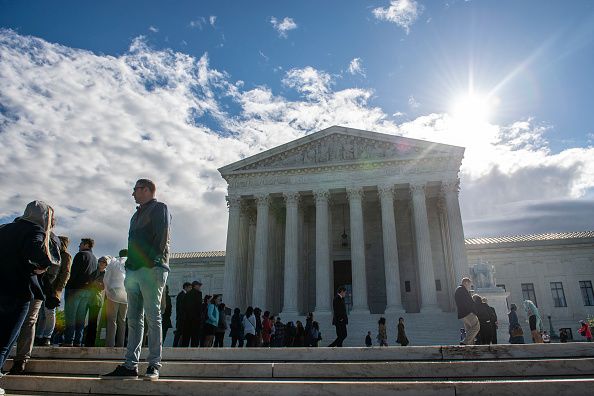
The Supreme Court overturned a 40-year-old precedent on Monday in a split 5-4 ruling that legal experts said did not bode well for the future of other well established cases like Roe v. Wade.
"Today's decision is deeply disturbing because it makes clear that five justices on the Court are not faithful to the principle of stare decisis and are willing to abandon precedent when necessary to reach a desired outcome in a case," Kristen Clarke, the president of the Lawyers' Committee for Civil Rights Under Law, told Newsweek.
"This raises grave questions about the Court's willingness to respect other important precedents, like Roe v. Wade," Clarke continued. "Across the county we are witnessing a carefully coordinated attack on Roe v. Wade, with abortion proponents bent on reopening the ruling before a newly configured Supreme Court."
In the past year, at least 15 states have introduced legislation to seriously limit abortion access. Last week, Georgia Governor Brian Kemp signed one of the most restrictive anti-abortion bills in the country, which bans the procedure after a fetal heartbeat is detected. A fetal heartbeat can be detected as early as six weeks, before many women know they are pregnant.
The law faces several court challenges; advocacy groups say that Republican-led state legislatures only move forward with these kinds of bills in the hope of getting them in front of the Supreme Court, which has a conservative majority due to Donald Trump's two nominations.
On Monday, the five conservative justices broke with the long-standing 1979 decision in Nevada v. Hall permitting a sovereign state to be sued in another state's courts without consent. Justice Clarence Thomas, who wrote the majority opinion, argued that the original ruling went against state immunity outlined in the Constitution.
The decision drew notable criticism from the other side of the bench, with Justice Stephen Breyer warning in a dissent that the move "can only cause one to wonder which cases the Court will overrule next."
Breyer also cited Planned Parenthood v. Casey, a 1992 ruling which upheld the fundamental right to an abortion, as a case that deserved respect as legal precedent.
Daniel Jacobson, a former lawyer in the Obama White House, told Newsweek that Breyer's reference to the case was a "not very thinly veiled warning that Roe v. Wade could be on the chopping block next for being overturned."
Though Harvard Law professor Laurence Tribe argued that while Breyer was right to challenge the majority's reasoning in this decision, he wouldn't "lightly assume that the chief justice, for instance, would be as willing to overrule the abortion precedents as he was willing to upend the interstate sovereign immunity precedent set by Nevada v. Hall."
Experts said that one of the most remarkable aspects of the court's decision was that it lacked compelling evidence that the original 1979 ruling was wrong.
"Especially noteworthy about the decision today was the majority's explicit concession that its new ruling was based on nothing in the Constitution's text but on general inferences from the constitutional design, structure and history," Tribe said.
Breyer also criticized the majority's lack of legal analysis, accusing them of only overruling the decision because they "came to agree with earlier dissenters on a difficult legal question."
But Justice Thomas argued that Nevada v. Hall "is contrary to our constitutional design and the understanding of sovereign immunity shared by the states that ratified the Constitution. Stare decisis does not compel continued adherence to this erroneous precedent."
The doctrine of stare decisis is that there is a strong presumption against overturning Supreme Court decisions. In practice, cases are usually only overruled if there are significant factual changes, or if there is proof that the ruling had become unworkable.
"The longer the precedent has been on the books, the greater the presumption is that it shouldn't be overturned," said Jacobson. "The idea is that it has become embedded in the fabric of our legal system. People have been relying on the decision for a longer period of time, and therefore there's greater reason not to overturn it."
Correction (5/14/19, 8 a.m.): This story incorrectly referred to Clarence Thomas as the chief justice of the Supreme Court. He is an associate justice.
Uncommon Knowledge
Newsweek is committed to challenging conventional wisdom and finding connections in the search for common ground.
Newsweek is committed to challenging conventional wisdom and finding connections in the search for common ground.
About the writer
Alexandra Hutzler is currently a staff writer on Newsweek's politics team. Prior to joining Newsweek in summer 2018, she was ... Read more
To read how Newsweek uses AI as a newsroom tool, Click here.








